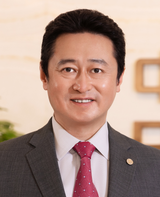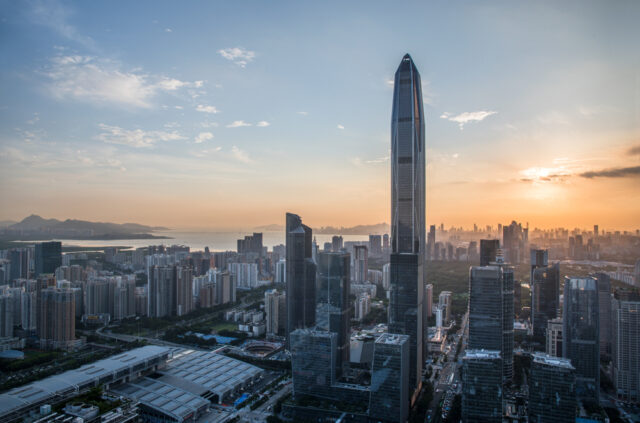Ping An Insurance Group’s chief investment officer Benjamin Deng said the insurer expected a “modestly high single-digit return” for the onshore Chinese equity market this year — a market where investors need to be opportunistic.
In the long-term, Ping An plans to add investments in domestic private equity, including venture capital (VC) and merger and acquisitions (M&As), as well as multifamily rental housing.
In 2024, Deng expected the onshore stock market to recover from the downturn in 2023 and pose a modest return.
“I think this is the time when we need to gear up our sector and security selection, and be adaptive and agile in a highly dynamic environment,” Deng told AsianInvestor in an interview.

Benjamin Deng, Ping An
“That’s going to be a big test for a lot of investment managers,” he said.
Sector-wise, Ping An is a long-term believer in new energy, technology, media, telecoms (TMT), medical, home appliances, and retirement care, for both its public and private equity investments.
“They are going to be big in China, and we are seriously allocating more resources to these,” he said.
Ping An Insurance is one of the largest asset owners in China. Its insurance investment portfolio stood at Rmb4.64 trillion ($653.9 billion) as of September 30, 2023.
Stocks represented about 11% of total assets. Private equity accounted for about 7%.
Ping An has a barbell allocation strategy in its stock portfolio, with a healthy split between high-dividend value stocks and growth stocks.
Although the Chinese equity market has been turbulent, Deng said Ping An remained stable in allocating between different risk factors, and kept its long-term perspective rather than riding on short-term momentum.
For example, it will retain its significant position in high-dividend value stocks to provide long-term cash flow.
The Chinese government last week announced an annual growth target of around 5% for the economy — similar to the 5.2% growth seen in 2023. Investors expect more stimulus measures to offer further clues on how the target would be met.
Deng noted that investing in China is no longer what it was like in the past 30 years, when investors didn’t have to be very technical and smart to be rich, thanks to China’s high-speed growth.
Going forward, it will need more scrutinisation of opportunities and more technical diligence in finding these opportunities, he said.
ALSO READ: HSBC Life HK sees alpha in Chinese equities via active strategy
“Does China have a lack of opportunities? Absolutely not. It’s full of opportunities. In a dynamic environment, investors need to be skillful in finding the right investments at the right point of the cycle.”
GOING PRIVATE
Amid an economic slowdown, China is in a loosening monetary cycle, with falling interest rates and falling bond yields. The 30-year Chinese government bond is yielding around 2.5%.
Under this environment, Ping An is increasing allocation to private equity for higher long-term returns compared to bonds, in order to help it meet its returns target and back its liabilities.
The lower rates mean lower funding costs for companies, Deng noted.
“When the funding costs are cheaper, we’re getting more bullish on both public and private equity markets,” he said.
“With more and more money being put into scientific research, medical research, information technologies, artificial intelligence, all these things…We think the private equity market is running into a new phase in China,” he said.
Compared to the past, when insurance companies mostly focused on pre-initial public offerings (IPOs), Ping An is moving slightly ahead of the curve in adding allocation to VC.
Although VC is a small portion of Ping An’s private equity portfolio, Deng believed it would open the door to new technologies and new developments, which could be “very interesting, with big potential” in the future.
In its PE investments, the insurer focuses on similar sectors as its public equity investments. Typical ones would be information and technology, and medical science.
For the later-stage PE portfolio, Deng thought mergers and acquisitions (M&A) would have healthy growth in China.
“China does not have a large M&A sector in the PE industry. I think it’s going to grow and that’s what we’re quite interested in,” he said, noting that natural candidates include traditional businesses like those in the manufacturing industry transitioning into the technology space.
Globally, Ping An will continue to invest in private equity through leading global PE houses, Deng said.
RENTAL ERA
Ping An is a major investor in China’s real estate market. Real estate investments — mainly real assets — accounted for 4.5% of the portfolio.
These investments were primarily rent-collecting properties including commercial and office properties, logistics real estate, industrial parks, and long-term rental apartments.
Since China’s property sector fell into trouble in 2020, Ping An has been cutting its exposure to developers, while following the country’s policy direction and adding positions in multifamily rental buildings in the residential space.
“We are pushing forward on investments in multifamily rental properties in China,” he said.
ALSO READ: Ping An CIO: China has tools to avoid ‘Japanisation’
In the past two years, the central government has been supporting the development of long-term rental apartments in major cities.
On January 8, the People’s Bank of China (PBoC) and the National Administration of Financial Regulation jointly issued a guideline pledging to boost financial support for large cities in developing long-term rental housing.
This includes a bigger supply of bank loans, expanding operators’ bond financing channels, and developing relevant real estate investment trusts (REITs).
Deng noted that this is a rapidly changing space, with new policies issued frequently. Many moving parts could affect the investment performance, including the costs of acquiring the land, construction, and management.
Hence, he said it is important to be adaptive in finding the right opportunities. To do so, Ping An typically works together with developers and operators.
“The bottom line is we like that sector. And we want to dedicate more meaningful money to these investments,” Deng said.
¬ Haymarket Media Limited. All rights reserved.




